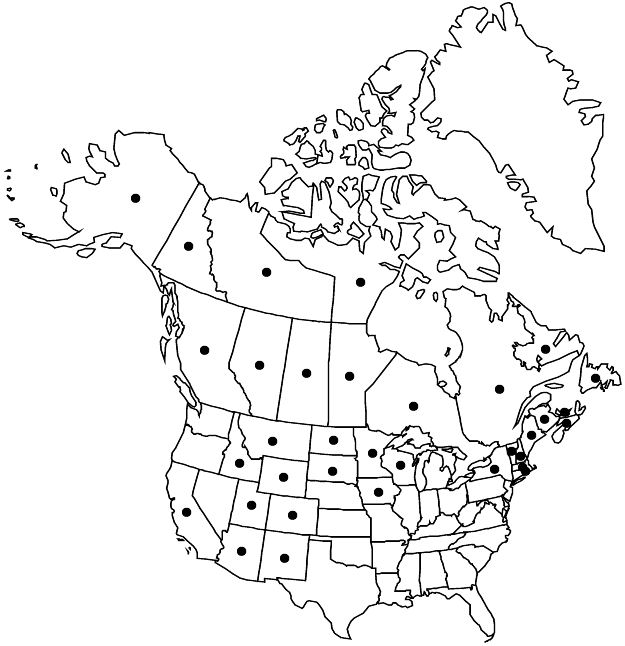Difference between revisions of "Fragaria virginiana subsp. glauca"
Canad. J. Bot. 40: 881. 1962.
FNA>Volume Importer |
FNA>Volume Importer |
||
| Line 15: | Line 15: | ||
|name=Fragaria virginiana var. glauca | |name=Fragaria virginiana var. glauca | ||
|authority=S. Watson | |authority=S. Watson | ||
| + | |rank=variety | ||
|publication_title=Botany (Fortieth Parallel), | |publication_title=Botany (Fortieth Parallel), | ||
|publication_place=85. 1871 | |publication_place=85. 1871 | ||
| Line 21: | Line 22: | ||
|name=F. glauca | |name=F. glauca | ||
|authority=Fernald | |authority=Fernald | ||
| + | |rank=species | ||
}} {{Treatment/ID/Synonym | }} {{Treatment/ID/Synonym | ||
|name=F. multicipita | |name=F. multicipita | ||
|authority=Rydberg | |authority=Rydberg | ||
| + | |rank=species | ||
}} {{Treatment/ID/Synonym | }} {{Treatment/ID/Synonym | ||
|name=F. terrae-novae | |name=F. terrae-novae | ||
| − | |authority= | + | |authority= |
| + | |rank=species | ||
}} {{Treatment/ID/Synonym | }} {{Treatment/ID/Synonym | ||
|name=F. virginiana var. terrae-novae | |name=F. virginiana var. terrae-novae | ||
|authority=(Rydberg) Fernald & Wiegand | |authority=(Rydberg) Fernald & Wiegand | ||
| + | |rank=variety | ||
}} | }} | ||
|hierarchy=Rosaceae;Rosaceae subfam. Rosoideae;Rosaceae tribe Potentilleae;Fragaria;Fragaria virginiana;Fragaria virginiana subsp. glauca | |hierarchy=Rosaceae;Rosaceae subfam. Rosoideae;Rosaceae tribe Potentilleae;Fragaria;Fragaria virginiana;Fragaria virginiana subsp. glauca | ||
| Line 45: | Line 50: | ||
|elevation=0–3400 m | |elevation=0–3400 m | ||
|distribution=Alta.;B.C.;Man.;N.B.;Nfld. and Labr.;N.W.T.;N.S.;Nunavut;Ont.;P.E.I.;Que.;Sask.;Yukon;Alaska;Ariz.;Calif.;Colo.;Idaho;Iowa;Maine;Mass.;Minn.;Mont.;N.H.;N.Mex.;N.Y.;N.Dak.;R.I.;S.Dak.;Utah;Vt.;Wis.;Wyo. | |distribution=Alta.;B.C.;Man.;N.B.;Nfld. and Labr.;N.W.T.;N.S.;Nunavut;Ont.;P.E.I.;Que.;Sask.;Yukon;Alaska;Ariz.;Calif.;Colo.;Idaho;Iowa;Maine;Mass.;Minn.;Mont.;N.H.;N.Mex.;N.Y.;N.Dak.;R.I.;S.Dak.;Utah;Vt.;Wis.;Wyo. | ||
| − | |discussion=<p>It is assumed that after the maximum glaciation, recolonization of most glaciated areas by < | + | |discussion=<p>It is assumed that after the maximum glaciation, recolonization of most glaciated areas by <i></i>subsp.<i> glauca</i> spread from the Alaska-Yukon refugium eastward to Hudson Bay, Newfoundland, and the New England states and, perhaps from a putative Rocky Mountains refuge northward to the Yukon and eastward to the Great Lakes area (G. Staudt 1999).</p> |
|tables= | |tables= | ||
|references= | |references= | ||
| Line 54: | Line 59: | ||
-->{{#Taxon: | -->{{#Taxon: | ||
name=Fragaria virginiana subsp. glauca | name=Fragaria virginiana subsp. glauca | ||
| − | |||
|authority=(S. Watson) Staudt | |authority=(S. Watson) Staudt | ||
|rank=subspecies | |rank=subspecies | ||
| Line 69: | Line 73: | ||
|publication year=1962 | |publication year=1962 | ||
|special status=Endemic | |special status=Endemic | ||
| − | |source xml=https://jpend@bitbucket.org/aafc-mbb/fna-data-curation.git/src/ | + | |source xml=https://jpend@bitbucket.org/aafc-mbb/fna-data-curation.git/src/f50eec43f223ca0e34566be0b046453a0960e173/coarse_grained_fna_xml/V9/V9_446.xml |
|subfamily=Rosaceae subfam. Rosoideae | |subfamily=Rosaceae subfam. Rosoideae | ||
|tribe=Rosaceae tribe Potentilleae | |tribe=Rosaceae tribe Potentilleae | ||
Revision as of 22:41, 16 December 2019
Stolons usually appressed ascending-hairy, sometimes almost glabrous. Leaves: petiole usually appressed-ascending-hairy, sometimes almost glabrous; leaflet blade dark green to bluish green, glaucous, terminal leaflets usually oblong-ovate to cuneate, sometimes roundish, not leathery, margins sharply serrate throughout, teeth: relative number 0.1–0.5. Peduncles and pedicels usually appressed ascending-hairy, sometimes almost glabrous. Flowers 11.5–17.7 mm diam. (pistillate), 16–25.5 mm diam. (bisexual and staminate). Fruits: bractlets clasping, spreading, or ± reflexed. 2n = 56.
Phenology: Flowering spring and fall.
Habitat: Moist to dry sites, open forests, forest edges, hedges, fields, roadsides, railroad embankments, often ruderal
Elevation: 0–3400 m
Distribution

Alta., B.C., Man., N.B., Nfld. and Labr., N.W.T., N.S., Nunavut, Ont., P.E.I., Que., Sask., Yukon, Alaska, Ariz., Calif., Colo., Idaho, Iowa, Maine, Mass., Minn., Mont., N.H., N.Mex., N.Y., N.Dak., R.I., S.Dak., Utah, Vt., Wis., Wyo.
Discussion
It is assumed that after the maximum glaciation, recolonization of most glaciated areas by subsp. glauca spread from the Alaska-Yukon refugium eastward to Hudson Bay, Newfoundland, and the New England states and, perhaps from a putative Rocky Mountains refuge northward to the Yukon and eastward to the Great Lakes area (G. Staudt 1999).
Selected References
None.